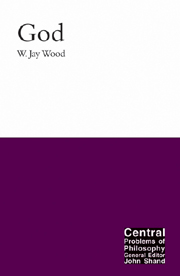Book contents
- Frontmatter
- Contents
- Introduction
- 1 Design arguments
- 2 Cosmological arguments
- 3 The ontological argument
- 4 The moral argument for God's existence
- 5 Religious experience and cumulative case arguments
- 6 Religious belief without evidence
- 7 The problem of suffering
- 8 The nature of God
- Conclusion
- Notes
- Bibliography
- Index
Introduction
- Frontmatter
- Contents
- Introduction
- 1 Design arguments
- 2 Cosmological arguments
- 3 The ontological argument
- 4 The moral argument for God's existence
- 5 Religious experience and cumulative case arguments
- 6 Religious belief without evidence
- 7 The problem of suffering
- 8 The nature of God
- Conclusion
- Notes
- Bibliography
- Index
Summary
Suppose there is a personal being perfect in wisdom, power and goodness, who created the world and sustains it in existence from moment to moment, and that your highest flourishing in this life and the next depends on your being rightly related to this being. In short, suppose that God exists. This, in a nutshell, is what theists profess the world over: a belief that unites the great monotheistic religions of Judaism, Christianity and Islam. If theism is true, it is a matter of incalculable weightiness, which partially explains why theism has been of perennial interest to philosophers. Two questions dominate philosophical writings about God. First, do we have good reasons to think that theism is true? In other words, do we have good reasons to think that anything answers to the description “omnipotent, omniscient, omnibenevolent creator and sustainer of the universe”? Second, if such a being exists, what is he like and how shall we understand his relation to the world? Few questions have so engaged philosophical attention, with new books appearing each year to defend opposing answers to these questions. The first question claims some priority, for if we conclude that no good reasons can be found to think that God exists, it scarcely seems that the second question merits much attention. But the two questions are not so easily separated. For one of the chief reasons cited by some philosophers for thinking that God does not exist is that he cannot exist! Some philosophers argue that the concept of an omnipotent, omniscient, omnibenevolent God is incoherent, so nothing could answer to this description.
- Type
- Chapter
- Information
- God , pp. 1 - 12Publisher: Acumen PublishingPrint publication year: 2010

